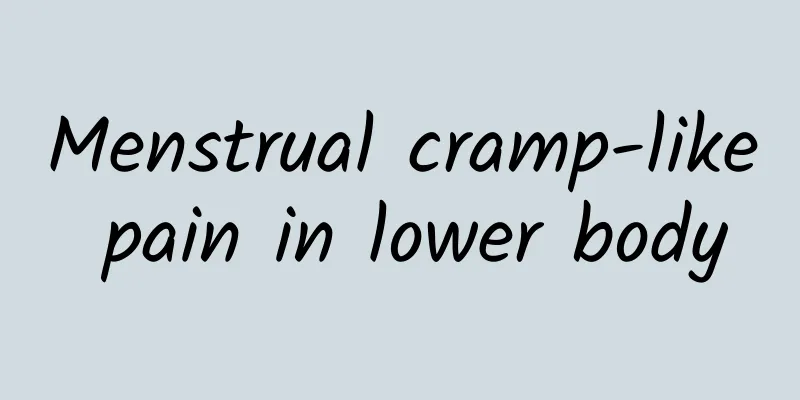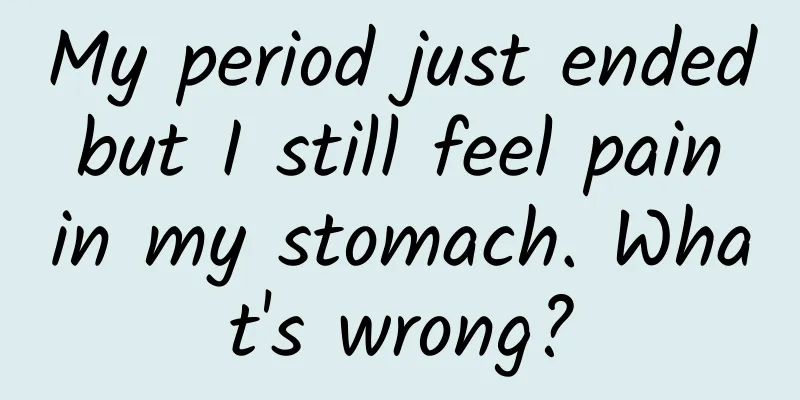Menstrual cramp-like pain in lower body

|
The cramp-like pain in the lower body during menstruation is usually caused by dysmenorrhea. Dysmenorrhea can be divided into two types: primary and secondary, each with different causes and relief methods. 1. Primary dysmenorrhea: This pain often occurs during menstruation, manifested as spasmodic pain, sometimes accompanied by headaches, dizziness, nausea and other symptoms. Its cause may be related to uterine hypoplasia, cervical stenosis, mental factors or allergic reactions. For milder primary dysmenorrhea, hot compress is a good method, just like covering the painful area with a warm blanket, which can effectively relieve discomfort. It is also important to avoid cold drinks and raw and cold foods, as these may aggravate the pain. If the pain is more severe, you can take calcium channel blockers before menstruation. This type of medicine can help relieve pain. 2. Secondary dysmenorrhea: This type of dysmenorrhea is usually related to infection, miscarriage, or diseases such as endometriosis and adenomyosis. For secondary dysmenorrhea, the commonly used treatment is oral blood circulation and analgesic drugs, such as motherwort granules or acetaminophen. These drugs can help relieve pain and improve symptoms. For more serious cases, you can consider using a drug ring, which is a small device that can help relieve dysmenorrhea symptoms. If the pain is unbearable and the patient has no desire to have children, hysterectomy may be the last choice. 3. Lifestyle adjustments: Regardless of the type of dysmenorrhea, maintaining a healthy lifestyle can help. Maintaining a regular schedule and proper exercise can promote blood circulation and relieve the discomfort caused by dysmenorrhea. Relaxation techniques such as yoga and meditation may also help relieve dysmenorrhea. 4. Diet adjustment: Eat more foods rich in magnesium and vitamin B, such as nuts, green leafy vegetables and whole grains, which help relieve muscle cramps and pain. Avoid excessive intake of caffeine and alcohol, as they may aggravate dysmenorrhea. 5. Psychological support: Dysmenorrhea is not only physically painful, but may also affect mental health. Sharing your feelings with friends or family and seeking their understanding and support may make you feel more comfortable. If necessary, you can seek help from a psychological counselor. By combining these methods, many women are able to effectively manage and relieve the discomfort caused by dysmenorrhea. Of course, everyone's physical condition is different, and it is most important to find a method that works for you. I hope these suggestions can help you relieve the troubles caused by dysmenorrhea. |
<<: What are the changes in menstruation before menopause?
>>: Brown discharge from Bartholin's gland cyst
Recommend
Why do uterine fibroids occur in early pregnancy? Causes of uterine fibroids in early pregnancy
Why do uterine fibroids occur in early pregnancy?...
Introducing the advantages of laparoscopic treatment of ectopic pregnancy
Do you know about laparoscopic treatment of ectop...
Can 1.4 cm of pelvic fluid be cured?
Examination of the male partner helps diagnose fe...
Can cervical precancerous lesions be treated with medicine?
Everyone is familiar with cervical precancerous l...
Eat a low-sugar diet to lose weight, no more scratching your head over the menu! The American weight loss queen teaches you how to make Italian dishes with zucchini without cooking
I tend to make bad eating choices at dinnertime, ...
Can laser surgery for cervical erosion lead to a normal birth?
Can laser surgery for cervical erosion lead to a ...
Tips for quick relief of dysmenorrhea
There is no "little trick to quickly relieve...
Endometriosis pain every day
Women with endometriosis may experience significa...
What are the foods that are good for women with cervical erosion? These foods have a therapeutic effect on cervical erosion
Cervical erosion is a common gynecological diseas...
Stomach pain, is a 4 cm ovarian cyst serious?
Stomach pain, is a 4 cm ovarian cyst serious? 1. ...
Common methods for regulating irregular menstruation
What are the main common methods for regulating i...
What to do if you have cervical erosion and get pregnant? Women with cervical erosion during pregnancy must know these
Many women do not pay much attention to personal ...
Say goodbye to thick thighs! 5 moves to restore your thigh gap
If this area in the center of the buttocks appear...
What are the common causes of uterine fibroids?
What are the common causes of uterine fibroids? 1...
Experts explain the symptoms of severe cervicitis that need to be vigilant
When the disease develops to severe cervicitis, t...









